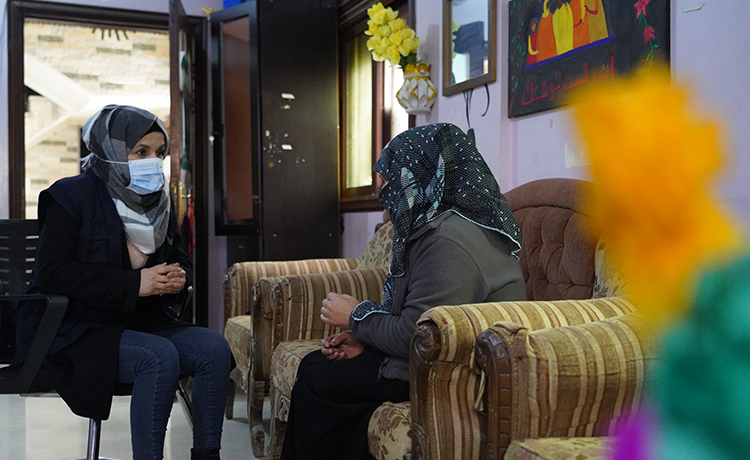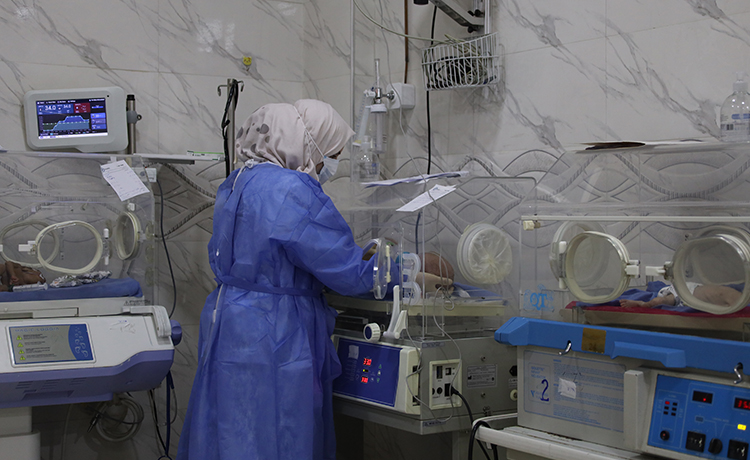News
From recovery to resilience: Zeynab's story after the earthquakes in Northwest Syria
- 21 February 2024
News
JANDARIS, Northwest Syria – “I was psychologically devastated, with nowhere to turn and no belongings,” said Zeynab Marai, a 45-year-old mother from Jandaris, in Northwest Syria. “My hopes were shattered.”
Zeynab lost her three children along with her home and belongings in the earthquakes that devastated Syria and Türkiye on February 6 last year. Reeling with grief, she sought shelter at a UNFPA-supported safe space for women and girls in Jandaris.
“The female workers at the safe space took care of me,” Ms. Marai said. “When they learned about my children's deaths, they reached out to offer support and that’s when I joined the centre again.”
As part of UNFPA's projects in Northwest Syria, these centres provide psychological counselling, medical referrals as well as programmes to learn new livelihood skills. A year after the earthquakes struck, many communities are still grappling with displacement, hunger, malnutrition and very limited access to even the most basic health care.
“Before the earthquake, Zeynab was learning hairdressing at the safe space to be able to earn a source of income,” explained Rania Hamo, a supervisor at the Ihsan organization, a local partner of UNFPA. “But it had been difficult for her to find a new place to live for her family in an overpopulated city like Jandaris.”
Although Zeynab and her family had finally managed to secure housing last year, Ms. Hamo continued, “Tragically, after a long wait for accommodation, she lost her new home in the earthquake.”

Comprehensive physical and psychological support
When the earthquakes struck, more than 4 million people already needed urgent humanitarian assistance in Northwest Syria and poverty levels were soaring. After more than 12 years of conflict and economic decline, the disaster created a crisis within a crisis.
Thousands of women and girls like Zeynab lost their homes and are still living in tents, impoverished and with little to no employment opportunities. The situation is particularly precarious for them as they are exposed to higher risks of gender-based violence, including rape, coercion and trafficking.
Sakina Al-Kotaibi, a field worker from Ihsan, explained, “Shared restrooms force women to navigate through tents at night, which increases their vulnerability to violence and harassment.”
These restrooms are also typically unsanitary and too few for the amount of people using them, leaving many women and girls vulnerable to infections and diseases.
Aya El Diaby, a supervisor with Ihsan, referred Zeynab to a psychiatrist, who used cognitive behavioural therapy to help on her path to healing. Although she is still living in a small tent with her injured husband, she said Zeynab is slowly getting back on her feet financially.
“After more than a year, she has made remarkable progress,” said Ms El Diaby. “She now runs a small shop in her community, selling cleaning supplies.”

An uncertain future
Since the immediate aftermath of the earthquake, UNFPA has supported thousands of women and girls across Northwest Syria with sexual and reproductive health services and supplies, as well as through centres where abused or at-risk women and girls can seek shelter and advice. For survivors of violence, twelve safe spaces have offered case management, counselling and medical referrals to help them heal and rebuild their lives.
More than 60,000 pregnant women were assisted with deliveries, Caesarean sections, prenatal and postnatal care and family planning advice. Nine emergency obstetric and newborn care units provided essential care for pregnant women and their babies and two mobile clinics delivered outpatient health services to reach those in need even in the least accessible areas.
But as funding dwindles and the world’s attention turns to other crises, more is needed to ensure the women and girls of Northwest Syria are not forgotten: This includes greater access to safe shelters, improving privacy and security measures in refugee camps, increasing awareness and education about gender-based violence, and strengthening support systems such as counselling services and medical care.